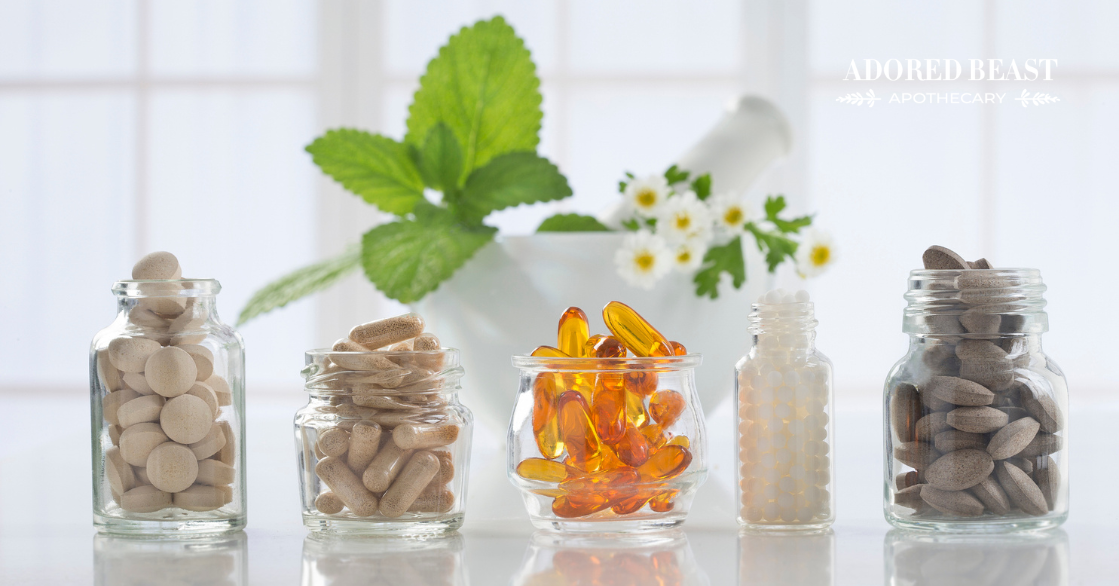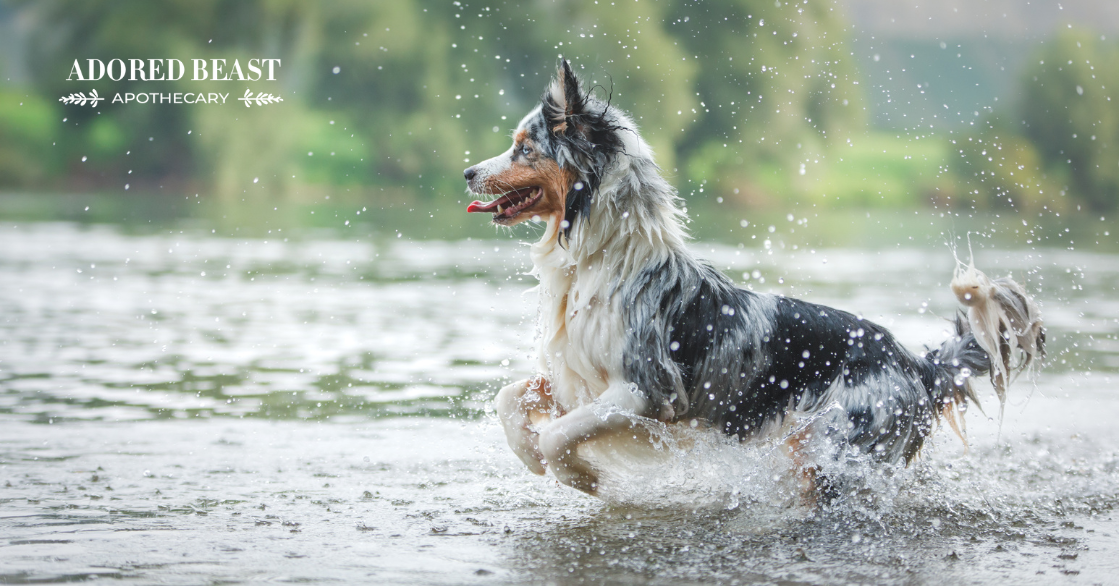As an animal pet supplement company, we get asked all the time if humans can also use Adored Beast products. And while we aren’t actually allowed to say yes, I will say that several ABA supplements are used by both the two-legged and the four-legged members of our household.
And maybe you’re thinking, when it comes to supporting our pets’ health naturally, perhaps it works both ways and it’s safe to reach into our own cabinet of vitamins and herbs. After all, we use supplements to help our immune systems, joints, digestion, and stress – so why not share the wellness love with our furry friends?
But here’s the important question: Can pets take human supplements?
The answer? Sometimes – but with caution. Here’s what you need to know.
Some Human Supplements are Safe – Even Beneficial
In many cases, pure, whole-food-based supplements (like certain herbs) can be shared – as long as they’re safe for pets and dosed properly (and well get to that in a minute).
Here are a few examples of human supplements that pets can sometimes take:
- Slippery elm (digestive support)
- Omega-3 oil (anti-inflammatory, skin, joint, brain)
- Probiotics (for gut health)
- Turmeric (anti-inflammatory)
- Chamomile (calming and digestive aid)
- Milk thistle (liver support)
These natural ingredients work similarly in both humans and pets. In fact, many holistic pet products (including ours) use the same herbs you’d find in your own supplements, just at doses and formulations tailored to animals.
But Here’s the Catch…
Just because something is safe or healthy for you doesn’t mean it’s safe for your pet.
Many human supplements contain additives, sweeteners, fillers, or flavourings that are completely fine for us, but potentially toxic to animals.
Here are some common ingredients in human supplements that can harm our adored beasts:
- Xylitol – An artificial sweetener found in chewable vitamins and gummy supplements; highly toxic to dogs and cats and can cause liver failure and death.
- Grapes or raisins or onions – Sometimes used in natural supplements (like bone broth) but can cause issues for pets.
- Caffeine or green tea extract – Safe for us in small amounts, but too stimulating (and potentially toxic) for pets.
- Essential oils – Often added to supplements, especially those for immune support; many are toxic to cats and dogs when ingested.
- High doses of iron, vitamin D, or calcium – Can be dangerous depending on the species and amount.
- Chocolate or cocoa powder – Occasionally found in “energy” supplements or chewables; toxic to pets.
- THC – We love CBD oil for our animals, but some CBD oils contain high levels of THC as well, which we would never recommend.
Even things like capsules and tablet coatings can contain ingredients that are hard for pets to digest.
When Human Supplements Can Be Useful
If you’re using single-ingredient supplements or high-quality herbs with no harmful additives, and you know the proper dose, human supplements can be a safe and effective option.
In these cases, using the same supplements you use – with modifications – can be a gentle and holistic way to help your animal thrive.
Here are tips of how to approach this properly:
- Check with an expert before giving any human supplement to your pet. You can also consult a holistic vet, animal nutritionists, or a canine or feline herbalist to create a plan that’s tailored to your pet’s needs and body weight.
- Do your own research. There are lots of articles online that will walk you through what is safe and waht isn’t.
- Read labels carefully. Avoid anything with sweeteners, artificial colours, or unlisted “proprietary blends.”
- Choose powders or liquids over tablets and capsules for easier dosing and better absorption.
- Use pet-specific brands when in doubt—they’re made with pet-safe ingredients and appropriate doses.
IMPORTANT: Safe Dosing: Even if a supplement is made from safe ingredients, the dose for a human is almost never appropriate for a pet, especially small dogs or cats. Giving too much of even a good thing can cause side effects or toxicity. Make sure you’re paying close attention, and again, when in doubt, ask an expert.
Better Safe Than Sorry?
So, can pets take human supplements? As you can see, yes, some of the same supplements we turn to can also be useful for our animals. Many of the healing tools found in nature – like herbs, probiotics, and omega-3s – can benefit both people and pets. But pets are not tiny humans, and what works for you could seriously harm them if not chosen and dosed carefully.
If you’re considering giving your pet a human supplement, always do your homework, read the ingredient list, and check with a trusted expert. Or, if you’re concerned, stick with a supplement specifically designed for an animal, just to be super safe.
Remember, your pet’s body is unique. Supporting it naturally is wonderful, but always do it wisely.












